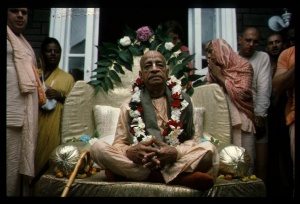CC Madhya 5.22

A.C. Bhaktivedanta Swami Prabhupada
TEXT 22
- mahā-kulīna tumi—vidyā-dhanādi-pravīṇa
- āmi akulīna, āra dhana-vidyā-hīna
SYNONYMS
mahā-kulīna — highly aristocratic; tumi — you; vidyā — education; dhana-ādi — riches; pravīṇa — enriched; āmi — I; akulīna — not aristocratic; āra — and; dhana-vidyā-hīna — without any wealth and education.
TRANSLATION
“You are a most aristocratic family man, well educated and very rich. I am not at all aristocratic, and I am without a decent education and have no wealth.
PURPORT
Due to pious activities, one can be enriched by four opulences: one may obtain birth in an aristocratic family, become highly educated, become very beautiful or get a sufficient quantity of riches. These are symptoms of pious activities performed in one’s past life. In India it is still current for an aristocratic family never to consider a marriage with a common family. Though the caste may be the same, to maintain the aristocracy such marriages are rejected. No poor man will dare marry the daughter of a rich man. Because of this, when the elderly brāhmaṇa offered the young brāhmaṇa his daughter, the young brāhmaṇa did not believe that it would be possible to marry her. Therefore he asked the elderly brāhmaṇa why he was proposing something unprecedented (asambhava). It was unheard of for an aristocratic person to offer his daughter to a person who was both uneducated and poor.